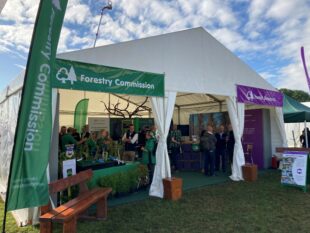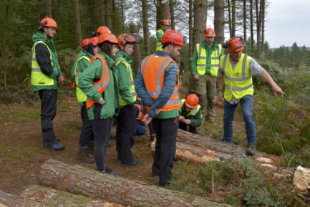 David Bole is our Head of Sector Capacity and Green Economy at the Forestry Commission. Here, he shares 7 helpful tips if you are considering a rewarding career in forestry.
David Bole is our Head of Sector Capacity and Green Economy at the Forestry Commission. Here, he shares 7 helpful tips if you are considering a rewarding career in forestry.
Have you been thinking about a career change? Are you considering a career in forestry? If so, we’ve compiled 7 top tips to help you make that jump into your role in forestry.
1. It’s never too late, forestry needs you!
Forestry is a rewarding career where you can truly make a difference by helping to mitigate the impact of climate change and large-scale biodiversity loss.
The UK government has legally binding environmental targets to increase tree cover from 14.5% to 16.5% by 2050. The forestry sector needs boots on the ground to plant trees and manage our woodlands, to ensure our future forests are resilient and can adapt to a changing climate.
There are also countless non-operational roles that are vital in ensuring these targets are met and the sector needs skilled people like you to make this happen.
Don’t be discouraged if you are changing career later in life, the sector has many career changers and the best time to begin a career in forestry is now!
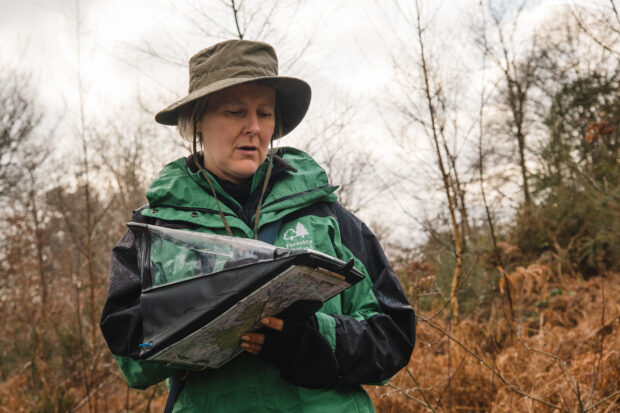
2. Forestry roles are incredibly diverse
Explore your interests and find what suits you. Forestry is more than the traditional outdoor roles that it is most known for.
Roles include:
- hands-on forest management
- wildlife conservation
- environmental science
- data analytics
- research and innovation
- timber production
- communications
- economics
- working with communities
and many more!
Familiarise yourself with the different kinds of jobs that are on offer by going to shows and events and talking to foresters to get a feel for forestry. This will help you to identify what roles overlap with your passion, skills and interests.
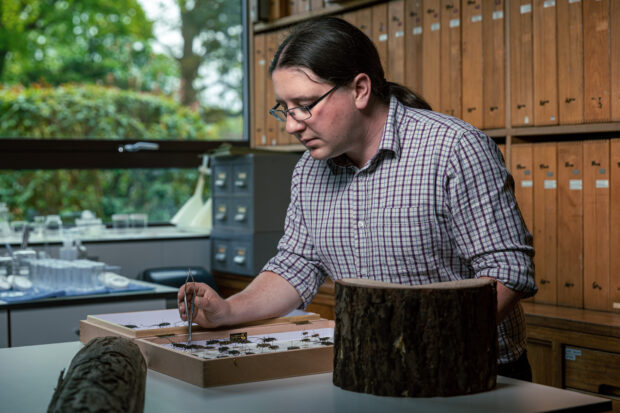
3. You don’t need to know everything
Part of a career in forestry is embracing life-long learning. Forestry is a dynamic sector that is continuously responding to new science and innovation. Foresters are always developing their own skillsets, so don’t be intimidated if you feel like you don’t know everything right away.
A good place to start is to head outdoors and give yourself the challenge of learning to identify different tree species, then find out about how each tree fits in a forest ecosystem.
Many skills can be learnt on the job, and you can gain more forestry knowledge through volunteering with your local community forest group, doing some extra reading or watching videos to teach yourself. Show employers your commitment and willingness to learn.
4. You’re not starting from scratch
Forestry is an interdisciplinary sector and you have plenty of transferable skills.
Are you good at communicating with people? Do you have a knack for organising things and sorting logistics? Are you a good problem solver? These are all skills that you can use in forestry, and that’s before even looking at interdisciplinary overlap such as management skills, engineering, geography and biology.
For example, military leavers have skills that take years to master like thinking on your feet, being good leaders and forward planning. In the context of forestry, this is crucial for visualising the long-term processes involved in timber harvesting and restocking.
When applying for jobs, think about how your transferable skills meet the job criteria and be sure to give examples that demonstrate them in use.

5. Prepare in advance for your move while working
You can prepare for a career in forestry while you’re still working your current job.
Distance learning courses are available on some bachelor’s and master’s degrees. This allows you to keep working as you build up your knowledge of forestry or other specialisms for non-operational roles.
If you’re looking to work outdoors, first aid qualifications are valuable to employers.
If you don’t want to go down the university route, you may instead benefit from short training courses and volunteering experiences. These will give you a leg up in the application process for apprenticeships and jobs.
Be sure to keep a portfolio that contains relevant certificates and qualifications to evidence your commitment to and knowledge of the sector.
6. Apprenticeships are great for career changers
If a career change into an operational forestry role feels like a huge pivot for you, consider an apprenticeship where you can meet like-minded people and learn as you work.
Apprenticeships are a fantastic way to gain knowledge and develop the practical skills you need for a successful career in forestry. You can apply for an apprenticeship if you already have a degree, providing your current degree is not in forestry or a related subject.
There are people of varying ages at different stages of their working life doing forestry apprenticeships, so it's worth keeping an eye out for one as demand for a place can be competitive.
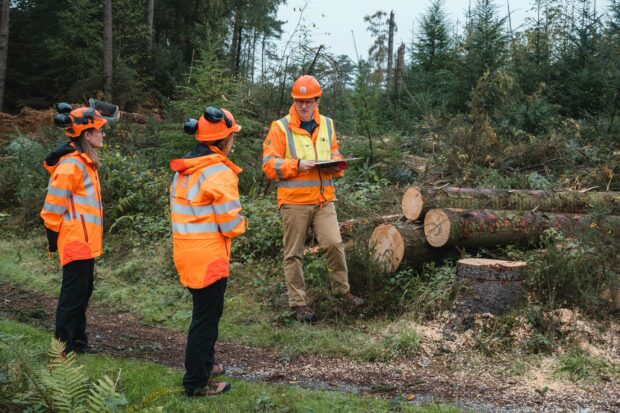
7. Let your passion for forestry shine!
Show that you are interested and have a genuine passion for forestry – it will go a long way towards showing the enthusiasm and commitment that you will bring to a role.
Proudly showcase your love of trees and show employers who you are as a person. Are you part of a local forestry group? Are you invested in your local greenspace? Let them know!
Sign up for newsletters and follow relevant social media accounts to keep up to date with organisations that operate in your area. Make yourself known through volunteering or meeting them at events to help build up your forestry network.
Most importantly, stay positive, persevere and remember that you bring added value to the forestry industry.
To find out more about a career in forestry, check out our collection of forestry careers resources on GOV.UK.
